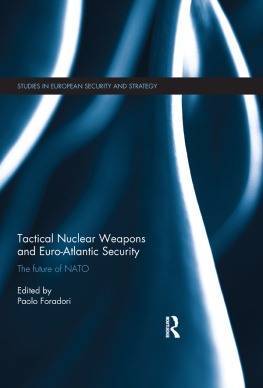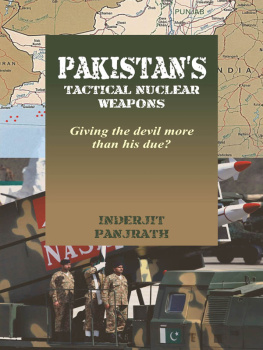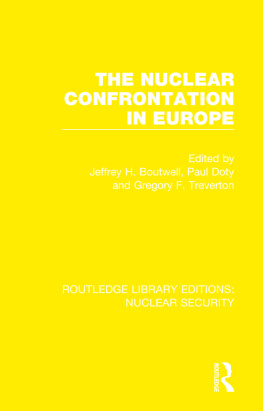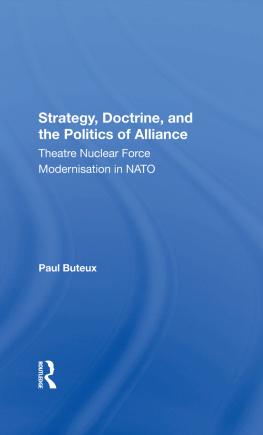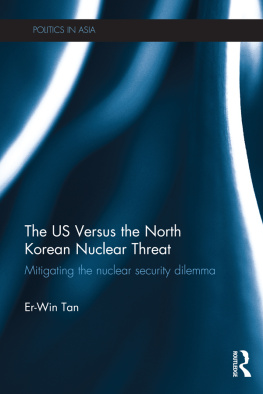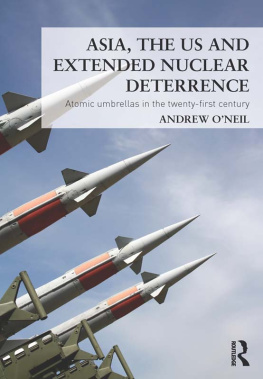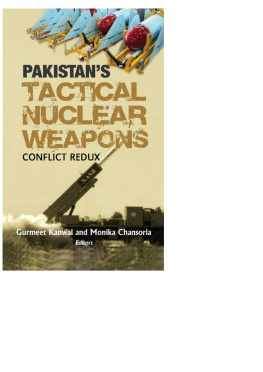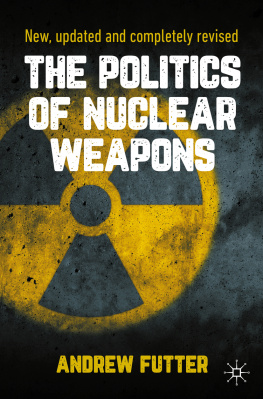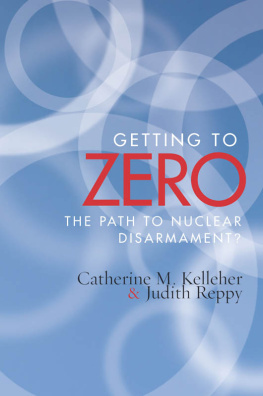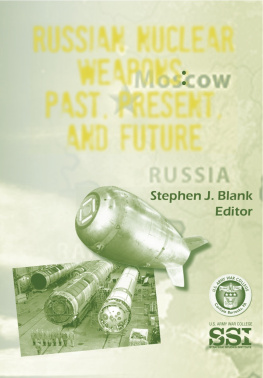Tactical Nuclear Weapons and Euro-Atlantic Security
This book offers a comprehensive examination of the important security issue of tactical nuclear weapons in Europe.
Nuclear nonproliferation and disarmament have returned to the top of the international political agenda. The issue assumes particular importance in regard to NATO, given that some 150-200 US tactical nuclear weapons (TNWs) are still present in five countries that are members of the Alliance (Belgium, Germany, Italy, the Netherlands and Turkey). The past few years have seen animated debate in the United States and Europe on the role of such weapons in the current scenario of international security, and whether they can be further reduced or completely removed from Europe.
Bringing together leading scholars and analysts of TNW issues with country-specific competences, this volume improves our understanding of this debate by providing in-depth analysis of the presence, role, perceived value and destiny of TNWs in Europe. The book addresses the issue in a systematic manner, taking into account the perspectives of all main actors directly or indirectly involved in the debate. This approach provides new and important insights that can inform both theoretical and policy work on a critical and timely international issue, especially during the ongoing review process of NATOs deterrence and defense posture.
This book will be of interest to students of European politics, European security, nuclear proliferation, and IR in general.
Paolo Foradori is Senior Lecturer in the School of International Studies at the University of Trento, and Associate Fellow of the Project on Managing the Atom at the Belfer Center for Science and International Affairs at Harvard Universitys Kennedy School of Government.
Studies in European Security and Strategy
Series Editors:
Sven Biscop
Egmont Royal Institute for International Relations, Belgium
and
Richard Whitman
University of Kent, UK
The aim of this series is to bring together the key experts on European security from the academic and policy worlds, and assess the state of play of the EU as an international security actor. The series explores the EU, and its member states, security policy and practices in a changing global and regional context. While the focus is on the politico-military dimension, security is put in the context of the holistic approach advocated by the EU.
First published 2013
by Routledge
2 Park Square, Milton Park, Abingdon, Oxon OX14 4RN
Simultaneously published in the USA and Canada
by Routledge
711 Third Avenue, New York, NY 10017
Routledge is an imprint of the Taylor & Francis Group, an informa business
2013 selection and editorial material, Paolo Foradori; individual chapters, the contributors
The right of the editor to be identified as the author of the editorial material, and of the authors for their individual chapters, has been asserted in accordance with sections 77 and 78 of the Copyright, Designs and Patents Act 1988.
All rights reserved. No part of this book may be reprinted or reproduced or utilized in any form or by any electronic, mechanical, or other means, now known or hereafter invented, including photocopying and recording, or in any information storage or retrieval system, without permission in writing from the publishers.
Trademark notice: Product or corporate names may be trademarks or registered trademarks, and are used only for identification and explanation without intent to infringe.
British Library Cataloguing in Publication Data
A catalogue record for this book is available from the British Library
Library of Congress Cataloging in Publication Data
Tactical nuclear weapons and Euro-Atlantic security: the future of NATO/edited by Paolo Foradori.
pages cm. (Studies in European security and strategy)
Includes bibliographical references and index.
1. Tactical nuclear weapons-Europe. 2. North Atlantic Treaty
Organization. 3. Europe-Military policy. I. Foradori, Paolo, 1968-
UA646.3.T27 2013
355.0217094-dc23
2013003312
ISBN: 978-0-415-63534-9 (hbk)
ISBN: 978-0-203-09377-1 (ebk)
Typeset in Times
by Wearset Ltd, Boldon, Tyne and Wear
Contents
PAOLO FORADORI
TOM SAUER
GIORGIO FRANCESCHINI AND HARALD MLLER
PAOLO FORADORI
KAREL KOSTER
MUSTAFA KIBAROGLU
SIMON LUNN
MILES A. POMPER
UKASZ KULESA
NIKOLAI N. SOKOV
PAOLO FORADORI
Paolo Foradori is Senior Lecturer in the School of International Studies at the University of Trento and an Associate Fellow of the Project on Managing the Atom at the Belfer Center for Science and International Affairs at Harvard University's Kennedy School of Government. From 2009 to 2011, he was Marie Curie Fellow at the James Martin Center for Nonproliferation Studies, Monterey Institute of International Studies, California.
Giorgio Franceschini is Research Associate at the Peace Research Institute Frankfurt (prif). Before joining prif, he worked in the Department of Theoretical physics at Berlin University of Technology, and in the telecommunications industry. At PRIF he recently concluded a research project in cooperation with Darmstadt University of Technology on emerging nuclear technologies and their proliferation potential. Currently he coordinates prif's activities within the EU Non-proliferation Consortium.
Mustafa Kibaroglu is Chair of the International Relations Department at okan University in Istanbul. He taught at Bilkent University in Ankara from 1997 to 2011; was Research fellow at the United Nations Institute for Disarmament Research (Geneva) and at the James Martin Center for Nonproliferation Studies, Monterey Institute of International Studies, California; and was Sabbatical fellow at the Belfer Center for Science and International Affairs at Harvard University's Kennedy School of Government (20042005). His work focuses on proliferation of weapons of mass destruction, Middle Eastern politics, and Turkish foreign policy.
Karel Koster is Researcher and Foreign Policy Advisor for the Socialist Party in the Netherlands, specializing in foreign policy, defense and nuclear proliferation issues. In 2006 the Netherlands section of the International Physicians for the prevention of Nuclear War published his Dutch language book Nucleaire Ont-wapening: Nog steeds bittere noodzaak (Nuclear Disarmament: Still a Bitter Necessity). More recently he has written on new methods of warfare, addressing the issues of the legality and political consequences of undeclared wars.
ukasz Kulesa is Head of the Non-proliferation and Arms Control project at the polish Institute of International Affairs. His research focuses on perspectives on nuclear disarmament, nuclear and conventional deterrence, and the role of missile defense. Between 2010 and 2012, he worked as Deputy Director of the Strategic Analyses Department at the National Security Bureau of poland.
Simon Lunn is Senior Associate Fellow of the European Leadership Network for Multilateral Nuclear Disarmament and Non-proliferation. He served as Secretary-General of the NATO Parliamentary Assembly from 1997 until 2007, following eight years as the Deputy Secretary-General. He was Head of Plans and Policy on NATO's International Staff from 1983 until 1989, and between 1979 and 1981 he worked at the US Congressional Research Service. During the 1970s, as Director of the North Atlantic Assembly's Defence Committee, he worked extensively on the role of nuclear weapons in NATO strategy. He is currently Senior Fellow at the Geneva Centre for the Democratic Control of Armed forces and a consultant with the Nuclear Threat Initiative in Washington, DC.

